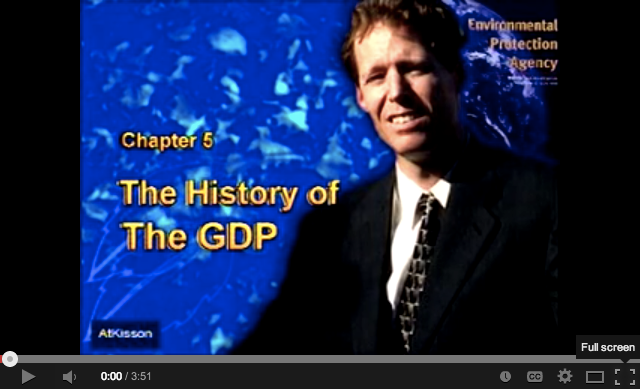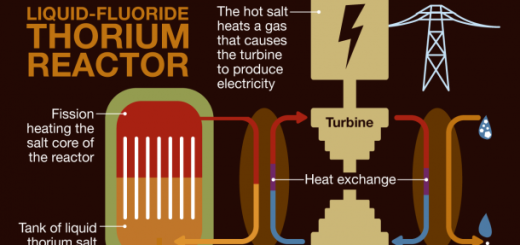Towards a High Satisfaction Economy
by Bryan K. Long
 Our obsession with GDP is killing us. What we call Gross Domestic Product is an attempt to sum all the value added, in every step of production, of every monetary good or service within our national economy. But GDP doesn’t measure the standard of living of anybody. And that’s where it fails us and leads us into ruin.
Our obsession with GDP is killing us. What we call Gross Domestic Product is an attempt to sum all the value added, in every step of production, of every monetary good or service within our national economy. But GDP doesn’t measure the standard of living of anybody. And that’s where it fails us and leads us into ruin.
Year to year growth in GDP doesn’t mean year to year growth in quality of life. If a chemical spill happens near your home, the money spent to clean it up is added to GDP. No wealth was created — in fact harm was done — but the clean up is considered value-added while the original harm is ignored. If a forest is cut down, the salaries paid the lumberjacks and the profits paid the shareholders are added to GDP. Is the processed wood a greater value gain than the loss of the forest? Perhaps, but the loss of the forest is not subtracted from GDP. In a country where healthy, clean tap water is the norm, does $15 Billion spent each year on bottled water improve our lives? Do the dividends paid to fast-food shareholders around the world add wealth to our nation sufficient to offset the health care costs of obesity?
Conversely and perversely, the endless work of a parent to nurture a child is not counted at all in GDP. A day spent relaxing with friends in the back yard doesn’t count at all. A week on vacation only counts for what you spend, not what you gain. Countless hours of volunteer work do not count at all. GDP only measures what we spend, not what value we gain.
GDP vs. Value and Satisfaction
Price as a measure of value is highly flawed. We are not rational beings when it comes to most economic decisions. In most circumstances, we do not calculate value well. We spend money foolishly more often than we spend it wisely. If we are desperate, we will pay more than we should; and if we feel wealthy, we will spend more than we should for some things and less than we should for others. The poor buy lottery tickets rather than food, and the rich buy expensive watches solely to show that they are rich. One buys false hope, and the other false status. One moment we are vigilant savers of a dollar or two on a purchase of food, and an hour later carelessly overspend $100 on entertainment. Many times we buy things just because other people are buying them — we follow the crowd and assume there must be value there. If we can not be trusted to spend money wisely to obtain true value in our lives, how can the measure of GDP tell us anything about the wealth and health of society?
We all know what really matters. A comfortable home. Good food to eat. Relationships. Respect. Meaningful work. Health. Learning. A little adventure. A healthy environment around us. A sense of security that we will have enough of all these things as we get older, and that our children will have these things too. Does an increase in GDP give us more of these things?
In 1968, GDP per person in today’s dollars was half of what it is now. But we are not twice as happy or twice as wealthy than my parent’s generation was then. About 12% of people then were below the poverty level, the same as now. Communism was feared in the way we fear terrorism, and nuclear Armageddon loomed then like climate change does now. But they had television to marvel over as much as we marvel over the Internet, and a health system that was getting better rather than worse, and falling unemployment. The Vietnam war was their Iraq, but the US was an ascendant manufacturing power, not one in decline. We may have more “stuff” now, but it would be hard to make a case that we our quality of life is twice as high now as then. So why do we look to GDP growth to tell us the “health” of the economy?
Could it even be that growth in GDP is making us poorer? Professor Herman Daly and others in the Ecological Economics school of thought argue that case convincingly. Daly argues that what GDP really measures is an increasing consumption rate of energy and natural resources, and that when you look at the unsustainable depletion of natural resources and the costs of pollution and climate change, we are clearly making ourselves poorer. [See the text of Herman Daly’s recent address to the US Society of Ecological Economics here].
What We Want: A High-Satisfaction Economy
Daly and the Ecological Economics school advocate a “steady-state” economy — that is, an economy in which the total throughput of energy and natural resources is relatively steady at a level consistent with sustainability over a very long period of time. I agree with this tenet, but argue that it is an unfortunate term. “Steady-state” implies an unchanging state, and nobody wants that. We all want things to “get better”. What we want is a higher quality of life. A better goal statement, then, is that we want a “High Satisfaction Economy”.
The question is, what policy to pursue to best enable things to get better? Demonstrably, it is not the current policy of GDP growth: more energy, more resource consumption, more work, more stuff, more waste, more pollution. If what we want is a high satisfaction economy, then we should measure satisfaction, and set policy to those measurements.
Numerous alternative measures of economic development have been proposed over the past several decades to account for resource depletion, environmental degradation, and quality of life indicators (health, education, income, employment, mortality, etc.). Although none of the proposed indicators are free of flaws, almost any of them give a better perspective on economic development and human welfare than does GDP. An excellent historical perspective on the various governmental and non-governmental efforts to track and use alternative indicators for policy is given in Flynn, Berry, and Heintz; Indicators: The Journal of Social Health Vol. 1, No. 4, Fall 2002. Yet none have been adopted by policymakers, who continue to promote development through growth as measured by GDP. Why is that?
Consider the following from the paper cited above:
During the [Clinton administration], the Bureau of Economic Analysis (BEA) of the U.S. Department of Commerce started preliminary work on a system of satellite national accounts to show the state of the environment, beginning with non-renewable mineral resources. The first set of Integrated Environmental and Economic Satellite (IEES) Accounts was released in 1994 and included a work plan to develop a set of prototype nonmarket accounts for subsoil assets (e.g., oil, gas, and major non-fuel minerals), renewable and other natural resources (e.g., trees, fish, and water resources), and nonmarket environmental assets (e.g., clean air and water). Concern in the U.S. Congress that the satellite accounts could somehow have negative implications for the minerals industry led to instructions that BEA desist from further activity until the need for such information and its methodology was confirmed by a study of the National Research Council of the National Academy of Sciences. From 1994 to 1999, the Panel on Integrated Environmental and Economic Accounting performed such an examination under the direction of Yale economist William Nordhaus and 11 other social scientists. The findings were summarized in a report entitled, Nature’s Numbers: Expanding the National Economic Accounts to Include the Environment, which urged the nation to explore alternative approaches to more fully account for the contributions made by nature to our economic well-being (1999). Despite the panel’s recommendations, the U.S. government did not authorize BEA to continue work on natural resources and environmental accounts.
A Conspiracy of Interests
What is at play here is a conspiracy not of malice, but of interests.
Politicians, in general, have four primary goals:
- to get elected and re-elected
- to gain in power and influence
- to ensure a profitable career after leaving office
- to do something to improve society (leave a legacy)
Unfortunately these goals are usually prioritized in the order given above, with the last given least attention. Politicians, therefore, are understandably interested in promoting the interests of powerful people and institutions, so long as it is legal enough not to interfere with getting re-elected. Politicians are understandably reluctant, in addition, to make policy recommendations that are against the interests of powerful people and institutions, knowing they will spend money to portray them as negative, hypocritical, and un-American. Ask yourself again why Al Gore lost the election to George Bush.
The three most powerful interest groups in the economy are those of the financial, energy, and manufacturing sectors. For each of these, the easiest path to profits has been the kind of economic growth measured by GDP. Banks create money based on fractional reserves and lend it to industry at interest. Industry uses the newly created money to finance the extraction of more natural resources, including fossil fuels, to transform those resources into more goods and services, and to convince buyers that they need those new goods and service. Speculators race to over-finance successful sectors, creating bubbles which collapse and create turmoil and financial insecurity.
Overall quality of life may go down, as discussed above, but shareholders realize a profit and executives are lavishly compensated. Thus the apparent quality of life gets better for the elite with an increasingly unequal allocation of income, generally unrelated to value created for society. As the overall quality of life goes down for the majority, even the rich begin to notice, and seek to get more rich in order to more effectively insulate themselves from the decline. The most obvious path to greater riches is the same path of exploitation they have been on, and so they lobby politicians to pursue policies of more growth, using the argument that a rising tide will lift all boats. Unfortunately, the majority of people in the world don’t have boats.
Towards a High-Satisfaction Economy
If we want a high-satisfaction economy, then we need to measure satisfaction so that we can evaluate policies designed to promote it. And we have to realize that until the most politically powerful constituencies want a high-satisfaction economy, it’s not going to happen. Fortunately, that opportunity exists right now. Sufficient numbers of rich, powerful people are recognizing that our planet and species is in crisis, and that insulating themselves from it isn’t the most adaptive strategy. Common wisdom is that Obama was elected on a groundswell of popular discontent — and I think that is true — but I also think Obama would not have succeeded if the more powerful interest groups were united against him.
The financial industry is in disarray at the moment, and may be ready to accept a new model of more prudent monetary policy. Manufacturers are squeezed between high commodity prices and falling consumer demand and are looking for efficiency and opportunity where ever they can find it. Even the energy sector is split, with entrenched fossil fuel interests pitted against renewable energy opportunists. Politicians have an opening, right now, to leave a legacy by initiating dramatic changes in the failing status quo.
Now is the time for a push towards sustainability and satisfaction by a widespread, popular demand for a revision of national accounting practices and the adoption of new indicies that measure environmental health and overall quality of life. With the new measurements, new policies can be put in place to enhance quality of life more directly, rather than hoping that growth in GDP will “trickle down” to personal satisfaction for the citizenry.
What You Can Do
Pass along these ideas, and call or write your representatives. Whenever they ask for money, tell them to start measuring and working towards quality of life for their constituency, and set aside blind faith in GDP growth. Climate change, healthcare, poverty, national security — all these things are dependent on a new system of accounting that measures what we value, not what we spend.




You’re right of course; we’ve known for decades about the limitations of measuring just growth. Robert F. Kennedy’s was one of the more eloquent statements:
Remarks of Robert F. Kennedy at the University of Kansas, March 18, 1968.
I like your linking the continued blind faith in measuring growth to, essentially, corruption arising from the conflicts of interests on the part of powerful players. I’ll suggest that Larry Lessig add examination of this dimension to his current work on the social costs of corruption and how to confront them.
It is also necessary, however, to more directly confront the arguments and admissions from economists as diverse as Benjamin Friedman (“The Moral Consequences of Growth”) and Paul Krugman, that productivity generally correlates well with standards of living. There seems to be quite a bit of truth to the notion that aggregate growth produces increases in quality of life, although there are certainly serious hidden costs and obvious distributional issues.
And it seems that much work remains to be done in figuring out, as a practical matter, how to measure something as ephemeral and variable as “time spent relaxing with friends in the backyard.” Such questions form part of the classic challenge/debate of the utilitarians over how you measure pleasure. And while “utility” is a poor substitute, it at least has the virtue of being subject to measures that are more readily quantifiable (like GDP). How do do we measure qualitative things like true happiness, satisfaction, and quality of life? Further attention should be given to building consensus around a common metric that captures more of these qualitative elements in a compelling way. That would seem a prerequisite to the rallying cry for such measures that I agree we need.
Excellent comment, Chip, and thanks especially for the Kennedy quote, as I had not seen that.
I want to clarify that when I discuss a conspiracy of interests, I was not referring to corruption in the base case of explict payoff or quid-pro-quo – although of course that happens. More often, the politician wants to do what is “right” or at least reasonable; but when what is right/reasonable is unclear, the politician is consciously or unconsciously willing to go along with powerful voices on the issue, or at least not vigorously oppose them.
Regarding non-monetary utility, it is always difficult to quantify true value/utility, whether you are looking a purchased good or a “day off”. I don’t think that alternative “proxies” like health, education, housing, employment are any less measurable for the purpose of creating an index of quality of life — and in fact are being measured and used in alternative indicies like the UN’s Human Development Index. They need to be improved, but already they are more valuable than GDP.
Chip, responding to your paragraph regarding the correlation of “productivity” with standards of living:
Looking back at the period from the end of WWII to say, 1968, there is a strong correlation between GDP growth and quality of life improvements. I would argue that in fact it was not just correlated but causal: increases in GDP brought increases in quality of life. We were applying fossil fuel energy like never before, consuming natural resources like never before, and making stuff like never before. Combined with scientific and technological improvements, life was getting better. The natural systems rule is this: increase the energy into a system and you can grow the energy dissipating functions within the system, until such time as you can no longer increase the energy flow, or until necessary supporting systems or material fail, or until waste chokes the system. After the late 1960s, we reached a point where energy and commodity inputs began to get more scarce, pollution started hurting more, and our quality of life plateaued and then began to decline, even while GDP continued to increase.
Any pointers to how this goal – satisfaction – blends in with the sustainability goal. Seems that they are independent and could be mutually exclusive.
In the short run, satisfaction can be the enemy of sustainability, as it clearly is in China right now. China is still full of poor people, with inadequate infrastructute. Understandably, they want more food, more infrastructure, more transportation. The only way to get those things right now is to dig and burn coal, and scour the planet for mineral resources. They give strong signs that they understand the need for sustainability, but are not willing to sacrifice rapid development. In the U.S., we seem to be caught in the grip of willful ignorance. We are like fat smokers who are unwilling to admit that our lifestyle is going to kill us. The doctor is not telling us we have to starve ourselves and give up everything pleasurable — indeed the opposite, the MD is telling us that a healthy life of exercise and good diet can be more satisfying. But we are trapped in bad habits by lack of willpower. Sustainability is not about deprivation either — it is about discipline, intelligence, work, and social connection.